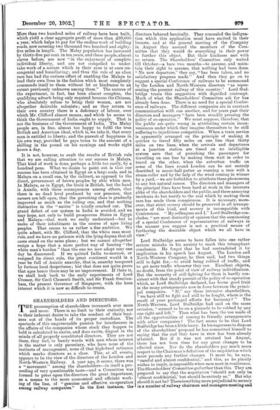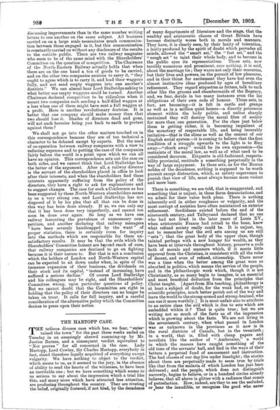SHAREHOLDERS AND DIRECTORS. T HE presumption of shareholders increaseth ever more
and more. There is no limit to their curiosity, nor to their indecent desire to take the conduct of their busi- ness out of the hands of its proper custodians. The spectacle of this ungovernable passion for interference in the affairs of the companies whose stock they happen to hold is calculated to excite, and does excite, disgust in the minds of all properly constituted directors. They are not there, they feel, to bandy words with men whose interest in the matter is only pecuniary, who have none of the instincts of management, none of that high-bred reticence which marks directors as a class. This, at all events, appears to be the view of the directors of the London and North-Western Railway. A year ago, it seems, there was a " movement " among the shareholders—in itself a pro- ceeding of very questionable taste—and a Committee was formed to press upon the directors the great importance, as a means to the more economical and efficient work- ing of the line, of " genuine and effective co-operation among railway companies." In the first instance, the directors behaved heroically. They concealed the indigna- tion which this application must have excited in their breasts, and at the general meeting of the Company in August they assured the members of the Com- mittee that they would do everything in their power to further this object. But their kindness met with no return. The Shareholders' Committee only waited till October—a bare two months—to assume, and main- tain their right to assume, that nothing had been done. " No new departure," they say, " has been taken, and no satisfactory progress made." And then they go on to suggest a special Conference of railways to be summoned by the London and North-Western directors " as repre- senting the premier railway of this country." Lord Stal- bridge treats this suggestion with dignified contempt. Much of what the Shareholders' Committee ask for has already been done. There is no need for a special Confer- ence of railways. The different companies are in constant communication with one another, and for years past their directors and managers " have been steadily pressing the policy of co-operation." We must suppose, therefore, that the public are quite wrong in attributing certain incon- veniences under which they imagine themselves to be still suffering to injudicious competition. When a train service is apparently arranged on the principle of making it quicker to travel fifty miles on one line than thirty miles on two lines, when the arrivals and departures at a junction station are timed on no intelligible system save that of punishing the passengers for travelling on one line by making them wait in order to travel on the other, when the suburban traffic on some of the lines round London can be not untruly described in music-hall patter as running a race with a steam-roller and by the help of the wind coining in winner. by a yard,— we are forbidden to attribute these phenomena to any but natural causes. The directors and managers of the principal lines have been hard at work in the interests alike of the shareholders and the public, and these annoying incidents do but testify to the zeal which by making them rare has made them conspicuous. It is necessary, more- over, that strict secrecy should be preserved in all arrange- ments of this kind, and secrecy is incompatible with Conferences. " My colleagues and I," Lord Stalbridge con- cludes, " are most distinctly of opinion that the summoning of a special Conference of representatives of railways in the manner you suggest is not a practical means of furthering the desirable object which we all have in view."
Lord Stalbridge seems to have fallen into one rather serious mistake in his anxiety to reach this triumphant conclusion. He forgot that he had contradicted it by implication in his speech last August. The London and North-Western Company, he then said, had two things still to fight for,—to avoid being robbed of traffic, and to get more traffic whenever they can. Excellent objects, no doubt, from the point of view of railway individualism. But the necessity of still fighting for them is hardly con- sistent with that steady pursuit of the policy of co-operation which, as Lord Stalbridge declared, has borne good fruit in the many arrangements now in force between the princi- pal companies. " If," say these intrusive shareholders, " we have still to fight and still to be fought, where is the result of your prolonged efforts for harmony " The North-Western, Lord Stalbridge had said on the same occasion, " seemed to be on a pinnacle to be robbed by any one right and left." Then what has been the use made of all the opportunities of coming to friendly arrangements with other companies ? The fact seems to be that Lord Stalbridge has been a little hasty. In his eagerness to dispose of the shareholders' proposal he has committed himself to saying that the end they have in view has been already attained. But if it was not attained last August, there has not been time for any great changes to be effected since. Nor do the shareholders pay much more respect to the Chairman's definition of the negotiation which must precede any further changes. It must be, he says, "careful and almost confidential," and this, as he plainly wishes to imply, is impossible when men meet in conference. The Shareholders' Committee go further than this. They are prepared to say that the negotiation "should not only be almost confidential,' but should be entirely so." But why should it not be? There is nothing more prejudicial to secrecy in a number of railway chairmen and managers meeting and discussing improvements than in the same number writing letters to one another on the same subject. All business carried on on a large scale necessitates much communica- tion between those engaged in it, but this communication is constantly carried on without any disclosure of the results to the outside public. There are two railway magnates who seem to be of the same mind with the Shareholders' Committee on the question of competition. The Chairman of the North-Eastern Railway actually holds that when there are on the one hand a ton of goods to be carried, and on the other two companies anxious to carry it, " they ought to agree which is to carry it, and load their waggons fully, and not send empty waggons into one another's districts." We can almost hear Lord Stalbridge asking to what better use empty waggons could be turned. Another Chairman declared competition to be ridiculous when it meant two companies each sending a half-filled waggon at a loss when one of them might have sent a full waggon at a profit. Here is another revolutionary doctrine. It is better that one company should make money than that two should lose it. Shades of directors dead and gone, will not such heresies bring you back to earth to protest against them ?
We shall not go into the other matters touched on in this correspondence because they are of too technical a character to be debated except by experts. But the need of co-operation between railway companies with a view to reducing expenses and to putting the case of the companies fairly before the world is a point upon which we can all have an opinion. This correspondence sets out the case on both sides, and we cannot think that Lord Stalbridge has the better of the argument. After all, a railway director is the servant of the shareholders placed in office to look after their interests, and when the shareholders find these interests apparently suffering from the policy of the directors, they have a right to ask for explanations and to suggest changes. The case for such a Conference as has been suggested by these North-Western shareholders seems to us a very strong one, and Lord Stalbridge has not disposed of it by his plea that all that can be done in this way has been done already. If so, we can only say that it has been done very imperfectly, and cannot too soon be done over again. So long as we have one railway lamenting the prevalence of unnecessary com- petition, and another declaring that railway managers " have been severely handicapped by the want " of proper statistics, there is certainly room for inquiry into the methods which are responsible for these un- satisfactory results. It may be that the evils which the Shareholders' Committee lament are beyond reach of cure, that railway companies are destined to go on fighting because it is their nature to. But that is not a conclusion which the holders of London and North-Western capital can be expected to sit down under when, in spite of the immense expansion of their business, the dividends on their stock and its capital, " instead of increasing, have suffered a serious decline." Of course Lord Stalbridge and his colleagues may be right, and the Shareholders' Committee wrong, upon particular questions of policy. But we cannot doubt that the Committee are right in holding that the policy of their directors can no longer be taken on trust. It calls for full inquiry, and a careful consideration of the alternative policy which the Committee desires to press upon their notice.











































 Previous page
Previous page